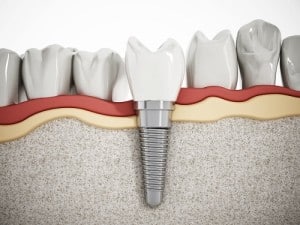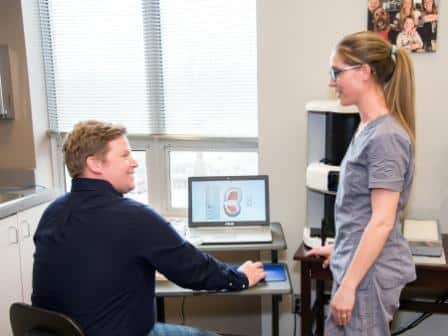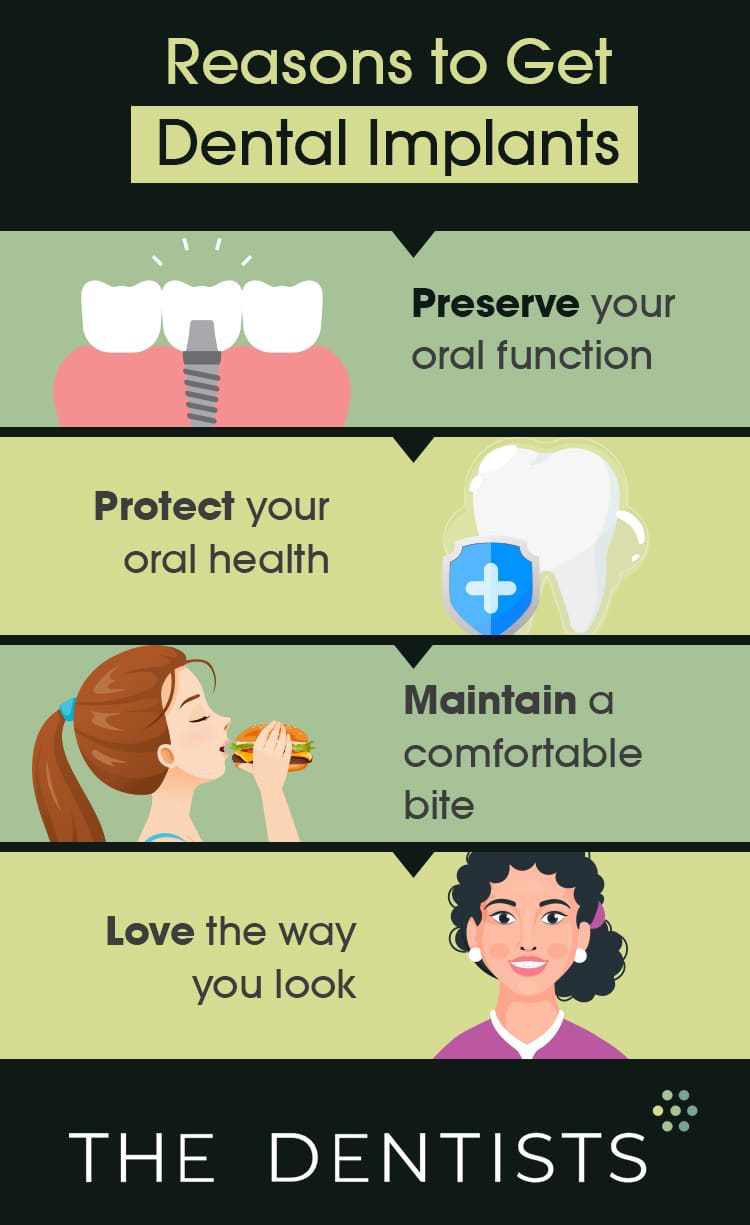Missing teeth are a common concern among adults, often caused by gum disease, injury, or biting into hard foods. At The Dentists, we proudly offer dental implants in Omaha, Bellevue, Lincoln, and nearby Nebraska communities to restore your smile’s health, comfort, and confidence. Our highly trained dentists have advanced education in implant dentistry and cosmetic restoration, ensuring every procedure meets the highest standards of care.
Led by award-winning dentist Dr. Jay Samuelson, who studied at the Las Vegas Institute for Advanced Dental Studies, our team combines expertise with a gentle, patient-focused approach. Dental implants are a long-lasting, lifelike replacement for one or several missing teeth, restoring both the appearance and full function of your smile.
What Are Dental Implants?
A dental implant acts as a full replacement for a missing tooth, taking the place of both the root and the crown. The titanium post is gently placed into the jawbone, where it fuses naturally to create a secure base for your new tooth. This post provides a stable foundation for the visible portion of the tooth, known as the restoration.

The restoration may take the form of a crown, bridge, or denture, each of which can be securely attached to the implant for a natural appearance and reliable function. Because implants replace both the tooth root and the crown, they provide the most stable, realistic, and lasting results of any tooth replacement option.
The Dental Implant Process
Your dental implant procedure will take place in one of our comfortable offices. Before beginning treatment, your dentist will review your plan, answer any last-minute questions, and ensure you are completely at ease.
If sedation is part of your treatment, it may be administered either orally (oral conscious sedation) or intravenously (twilight IV sedation) to help you stay calm while remaining responsive. We use a local anesthetic to keep the treatment area fully numb, allowing you to stay relaxed and free of discomfort throughout the procedure.
After the area is numb, the dentist creates a small opening in the gums to reach the jawbone. A precise space is made for the titanium post, which is then carefully inserted. The gums are closed with a small stitch, and the implant is left to heal beneath the surface. During this time, bone tissue naturally grows around the implant in a process called osseointegration, creating a secure bond between the implant and your jaw.
Patients who receive sedation should arrange for a loved one to drive them home after the procedure, as it takes time for the medication to wear off fully.
The Dental Implant Timeline
Every patient’s smile and treatment plan are unique, but most dental implant journeys follow a similar timeline.
- Consultation and Planning: Your dentist begins by evaluating your teeth, gums, and bone structure using X-rays or 3D imaging. Together, you’ll discuss your goals, review your options, and create a personalized treatment plan.
- Implant Placement: The titanium post is carefully placed into the jawbone during a comfortable, precisely guided procedure. The gums are closed to allow proper healing.
- Healing and Integration: Over the next several weeks, the bone naturally fuses with the implant, forming a strong, stable foundation. During this time, you may wear a temporary restoration if needed.
- Final Restoration: When the healing process is complete, your personalized restoration is placed on the implant, giving you back full comfort, function, and confidence in your smile.
Your dentist will explain each step, address your concerns, and make sure you’re comfortable and confident before, during, and after treatment.
The Benefits of Dental Implants
Dental implants offer many advantages, both cosmetic and functional:
- Replace the missing tooth root and visible crown
- Look, feel, and function like real teeth
- Support natural facial structure and prevent bone loss
- Provide long-lasting, durable tooth replacement
- Allow normal eating, speaking, and smiling with confidence
- Are easy to clean and maintain with regular brushing and flossing
- Stay securely in place without the need for adhesives or removal
Because the titanium post bonds with your bone, dental implants help prevent the bone deterioration that can occur when a tooth is missing. This protection helps maintain your jaw shape and prevents the sunken appearance that sometimes develops with long-term tooth loss.
Mini Dental Implants
Mini dental implants are a smaller, miniaturized version of traditional implants. They are often used to stabilize dentures, particularly when full-sized implants may not be necessary or when bone density is limited. These smaller posts are placed in strategic locations within the jaw to support a denture, which attaches securely to the implants with specialized fittings.
One of the main benefits of mini implants is that placement is generally faster, simpler, and less invasive. The procedure can typically be completed using only local anesthetic, resulting in minimal discomfort and a quicker recovery. After placement, patients usually experience little downtime and can return to normal activities quickly.
Ask our dentists whether mini dental implants are a good option for you. Some people are better suited for conventional implants, depending on their bone structure and treatment goals.
Recovery and Care
It is normal to experience mild to moderate discomfort after the anesthetic wears off. Over-the-counter medications such as ibuprofen can manage discomfort effectively when taken as directed. It may help to begin pain relief before it feels necessary to prevent soreness from building.

Mild swelling and slight bleeding can occur within the first 24 hours and should subside quickly. Follow your dentist’s post-care instructions to ensure smooth healing. Avoid hot or spicy foods, and eat soft foods that do not require much chewing. Brush gently with a soft-bristled toothbrush and begin using salt-water rinses the day after your procedure as directed.
When healing is complete, maintain your implants with regular brushing, flossing, and twice-yearly dental visits to keep your smile healthy. If you grind or clench your teeth at night (a condition called bruxism), your dentist may recommend a custom mouthguard to protect your implants and restorations from pressure or wear.
Caring for Your Smile Long-Term
Dental implants are designed to last for many years, but long-term success depends on maintaining healthy habits. Continue brushing for two full minutes twice a day, floss daily, and schedule routine dental visits every six months. These simple steps protect your implants and keep your smile looking its best.
If you notice any signs of gum irritation, such as redness or bleeding, contact your dental team promptly. Small issues are easiest to address early. When cared for properly and monitored by your dentist, dental implants can provide lasting strength and a natural appearance for decades to come.
The Connection Between Gum Health and Dental Implants
Healthy gums are the foundation for strong, successful dental implants. The tissue around your implants helps anchor and protect them, so keeping your gums healthy is essential for long-term results. When you brush and floss every day, you clear away the bacteria that can irritate your gums and protect the tissue around your implants.
If you ever notice bleeding, swelling, or tenderness, don’t wait to reach out to your dentist. Consistent professional cleanings and exams make it easier to detect gum concerns early, before they threaten your implant. We believe healthy gums create the foundation for a healthy, confident smile, and we’re here to help you maintain both.
Is a Dental Implant Right for You?
While dental implants are suitable for many people, not everyone is an immediate candidate. Ideal candidates generally:
- Are in good overall health
- Have healthy gums free from active gum disease
- Possess enough bone density to support an implant
- Are committed to maintaining proper oral hygiene
- Want a durable, long-term tooth replacement solution
During your consultation, our dentists will perform a comprehensive examination, review your medical history, and take X-rays to determine whether implants are the right choice for you. If another solution would better meet your needs, we will discuss all available tooth replacement options in detail so you can make an informed decision.

Common Concerns About Dental Implants
It’s completely normal to have concerns before beginning dental implant treatment. Many patients worry about pain, healing, or how long the process will take. Our goal at The Dentists is to make sure you feel confident, informed, and at ease throughout every stage of care.
We take time to explain your treatment in detail and answer all your questions before we begin. Our gentle approach, advanced technology, and sedation options allow us to perform implant procedures with minimal discomfort and maximum precision. Whether you are nervous about surgery or simply curious about what to expect, our team is here to listen and guide you every step of the way.
Patient Testimonial
"My wife and I started coming here a few years ago after bad experiences with other dentists. We have nothing but fantastic care and a great friendly atmosphere. They genuinely care about you and your family my wife loves Dr. Demman and so do I."
Frequently Asked Questions
Your comfort is our priority throughout every dental implant procedure. The treatment area is fully numbed with local anesthesia, and patients who feel anxious can choose from several safe sedation options for a calm, worry-free visit. You may feel slight pressure, similar to when receiving a filling, but the procedure itself should not be painful.
Some mild discomfort, swelling, or bleeding is normal within the first day or two. These side effects are temporary and can be easily managed with rest and over-the-counter medication. Most patients feel well enough to resume normal activities after a few days.
Dental implants are one of the most durable restorative options available. With proper oral hygiene and regular dental visits, they can last for decades or even a lifetime. Maintaining healthy gums and bone tissue is key to long-term success.
Mini implants are smaller in diameter and are used primarily to support dentures. They are less invasive to place and generally allow quicker recovery. Traditional implants are larger, providing greater stability for single- or multiple-tooth replacements. Your dentist will recommend which type best fits your needs.
Most dental implants last indefinitely, but in rare cases where the implant fails to integrate properly with the bone or becomes infected, removal may be necessary. When possible, a new implant can be placed after the area has healed.
Why Choose The Dentists of Omaha for Dental Implants?
Our patient-centered approach has earned us Omaha Magazine’s “Best Family Dentist” for 17 years running. At The Dentists of Omaha, your comfort, health, and convenience come first. Each patient is treated like family, and with offices in Hillsborough, Village Pointe, Ralston Square, and Dundee, exceptional care is always close to home. Our team of six experienced dentists, including award-winning cosmetic dentist Dr. Jay Samuelson, who trained at the Las Vegas Institute for Advanced Dental Studies, brings world-class skill to every procedure.
From routine care to advanced treatments like dental implants, we combine modern expertise with genuine compassion. Omaha may be a large city, but our practice delivers the warmth, familiarity, and personal attention of a small-town dental office.
Restore Your Smile with Dental Implants in Omaha & Bellevue
Dental implants are a long-lasting, natural-looking solution for missing teeth that help restore confidence, comfort, and oral health. At The Dentists, our compassionate and experienced team proudly serves patients in Omaha, Bellevue, Lincoln, and nearby areas of Nebraska, providing advanced restorative dentistry in a welcoming environment focused on your well-being. Please contact our experienced implant dentists in Omaha at Hillsborough: 402-445-4647, Village Pointe: 402-505-7474, Ralston Square: 402-733-4441, or Dundee: 402-502-5593 today.